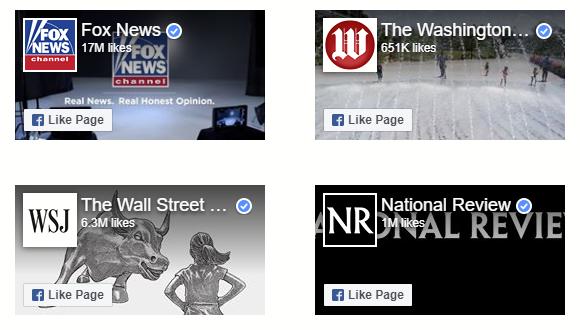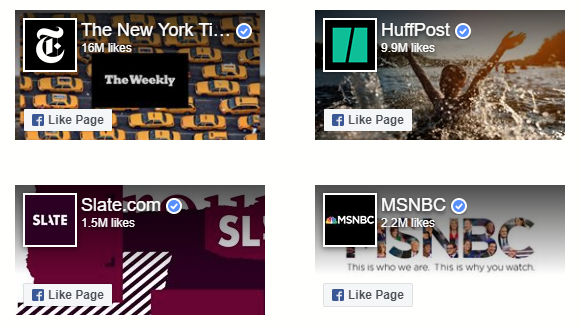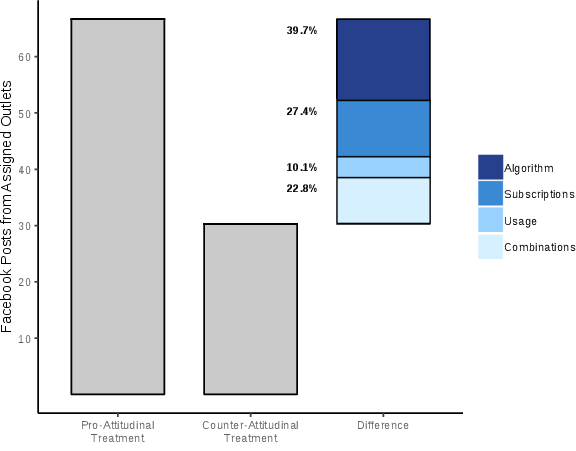So excited and fortunate to have my JMP published! I conducted a field experiment to test what happens when people are exposed to more conservative or liberal news on Facebook. Details below. (1/N, my first Twitter thread :) https://twitter.com/AEAjournals/status/1319625431318958085
Should we be worried about echo chambers and filter bubbles on social media? To create variation in Facebook feeds, I randomly nudged participants to like either liberal Facebook pages, such as MSNBC, or conservative pages, such as Fox News (2/N)
Most participants complied with the nudge and liked at least one of the pages offered. Even among participants offered counter-attitudinal outlets (liberals offered conservative outlets or vice-versa) 48% complied with the treatment (3/N)
Furthermore, when posts from the offered outlets appeared in their Facebook feed, participants started visiting the outlets’ websites more often and even shared the posts with their social network. This substantially affected the average slant of news sites visited (4/N)
My takeaway is that news is often consumed incidentally. Consumers do not always optimize their news consumption based on their preferred slant, but rather read whatever is most accessible. Therefore, social media platforms can dramatically affect news consumption (5/N)
Even though the slant of news changed, an endline survey two months after the intervention reveals that participants did not substantially change their political opinions. With more than 17,000 endline respondents, this null effect is precisely estimated (6/N)
However, I find that the treatments had an effect on affective polarization. Exposure to counter-attitudinal content led to more positive attitudes toward the opposing political party, compared to exposure to pro-attitudinal content (7/N)
Finally, I ask why participants randomly offered pro-attitudinal outlets were exposed in their feed to more posts from the offered outlets, compared to participants offered counter-attitudinal outlets. I decompose this gap to three main explanations: (8/N)
a) Participants liked more pro-att. outlets when offered; b) participants offered counter-att. decreased their Facebook usage (marginally sig.) c) Facebook's algorithm showed participants more posts from pro-att. outlets conditional on liking outlets (a "filter bubble") (9/N)
Combined, the results suggest that some of the recent increase in affective polarization can be explained by more segregated news consumption and that social media algorithms may be contributing to polarization (10/N)
The paper also offers a potential solution. Since people are willing to engage with cross-cutting content, nudges diversify news on social media can be effective. In fact, anyone can try liking opposing outlets on Facebook and reflecting on how that affect attitudes (11/N)
I'll sum up with a couple of personal lessons I learned that could be useful for graduate students in early stages: (12/N)
1) There were several times when I thought this project was going to completely fail (when Facebook changed their policies, when the project didn't generate initial excitement, when some results did not turn out the way I expected). I'm glad I did not give up on it (13/N)
2) It's a cliche but still worth repeating - I was able to persist working on this project, gather more data, redesign the experiment, provide more robustness tests, etc. mostly because I was passionate about it. Studying things that are interesting is worth it (14/N)
I owe so much to everyone who helped from the beginning: Ebonya, @deankarlan, Joe; @aecoppock, @mattsson_martin, @DanieliOren; to colleagues who provided feedback: @BrendanNyhan, @HuntAllcot, @EranAmsalem, @eoinmcguirk, @Matt__Graham, @alexeymakarin, @DG_Rand, @jaya_wen_econ
the entire Yale labor/public group and many others, to the editor @sdellavi and the referees who substantially improved the paper, and mostly to my wife Mor, who heard me give this talk way too many times :) Thank you!

 Read on Twitter
Read on Twitter




